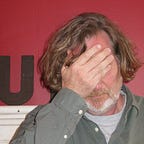RFBC #13: Birnam Wood (and a link to the show)
Birnam Wood: a prophetic sign to Macbeth that he was invincible and a symbol of his downfall. Maybe also a symbol of nature in revolt against human depredation, which might be something we should be thinking about here in the summer of wildfires and floods and tornadoes and scorching temperatures and such. “They” say this will be one of the coolest summers for the rest of our lives. We’re inclined to believe them.
So, we would wager, would the members of Birnam Wood. In addition to being an important element of the Scottish play, it’s also the name of a collective of radical Kiwi gardeners who are central to a book of that same name written by Eleanor Catton, whose last book, The Luminaries, won the 2013 Man Booker Prize.
All of which is to say that Birnam Wood was the subject of our 13th meeting of Radio Free Book Club. You can listen to the show on Mixcloud or wherever you stream podcasts. If you haven’t yet read the book, beware: There are spoilers on the podcast. And below. We hope you’ll give it a read and come on back.
Show notes:
The RFBC crew for our July 2023 show was Indianapolis writer Ken Honeywell; former Butler University professor and award-winning author Susan Neville; novelist, Butler University professor, and flaneur Dan Barden; and Indianapolis writer and episode MVP Jen Bingham. Our show was recorded at Listen Hear in Indianapolis and produced by the outstanding Oreo Jones for 99.1 WQRT-LP.
A bunch of Eleanor Catton rookies. Most of us, anyway. Only Ken had read The Luminaries and was looking forward to Birnam Wood.
A novel of ideas. Susan liked that Birnam Wood is a novel of ideas and compared it to the work of Doris Lessing—in particular, The Good Terrorist. We agreed that the book is filled with interesting arguments about capitalism and feminism and environmentalism and cancel culture and technology and much more; in fact, Susan’s biggest complaint was that she wasn’t finished with the issues and didn’t want it to end.
A bunch of nice, idealistic kids. That’s what Birnam Wood seemed like to us. The problem was, they weren’t such kids anymore. In general, we had a hard time taking them seriously. We agreed that although most of what they were doing was illegal, it was not terrorism. (If they were terrorists, would we have taken them more seriously?)
Robert Lemoine: Evil Villain of the Year. Gosh, billionaire Robert Lemoine is a horrible person. Dan didn’t think he took enough advantage of henchmen to do his dirty work. But doesn’t doing all the horrible things himself make him even more evil?
And who really killed Owen Darvish? By all appearances, it was a horrible accident: Shelley, tripping on the acid Lemoine brought to Birnam Wood, commandeers the van and runs into Darvish, whom no one expected to be there. But Susan had another idea: Perhaps Lemoine brought the acid to trip everyone out, and Lemoine (although it would had to have been one of his henchmen) killed Darvish as part of an evil plot. He did, after all, change the password on the front gate, and it was at least implied that he know Darvish was coming to the property.
About the characters. We agreed that, among the book’s six or seven viewpoint characters, Mira was set up as the protagonist. Dan had a hard time with Tony; the rest of us were rooting for him, especially at the end. Jen found Shelley to be almost adultish. But all the characters were victims of hubris. Which perhaps set them up for…
…that ending. Wow. Did not see that coming. Nearly every character we’ve met over the course of the book is dead. Jen said she likes endings where everyone dies. Susan was very disappointed the first time she read it, but made peace with it the second time through. Ken defended the ending based on the sendup of late-stage capitalism and climate change: We’re all goners. The world belongs to the nameless henchmen.
Maybe engage the TV in your mind. Dan increasingly found Birnam Wood’s characters to exist in service of the plot. But he also said that, if he were grading the novel the way he’d grade a TV show, he’d be more forgiving. An interesting question: Do you put up with more character inconsistencies and random plot devices in a TV series than you do in a novel?
Would we recommend it? Four yeses. Dan praised Catton as a stylist, and would recommend Birnam Wood for select readers. Susan loved reading it and was especially interested in the ideas the novel explored. Ken and Jen both liked it quite a bit, and would recommend it with the understanding that it’s more of a thriller than anything. (Except, Ken did not say but would, maybe you should read it as a satire.)
Bonus recommendations: Jen recommended Big Swiss, the new novel by Jen Beagin. Susan mentioned R.F. Kuang’s Yellowface, Life With Picasso by François Gilot and Carlton Lake, and Larry Lockridge’s The Woman in Green on her way to recommending Demon Copperhead by Barbara Kingsolver. Dan recommended volume three of Robert Caro’s massive LBJ biography, Master of the Senate. Ken recommended The Ministry for the Future by Kim Stanley Robinson.
Next month: We’ll look at America through the eyes of a Ghanaian brother and sister with very different fortunes in DK Nnuro’s debut novel What Napoleon Could Not Do. Please join us—and invite your sibs.
